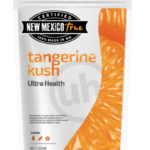
By Phaedra Haywood / Santa Fe New Mexican
Published on July 28, 2016
Pickles, pistachios and paintings are all made-in-New Mexico products that have been given permission to use the coveted New Mexico True Certified program stamp.
But not medical marijuana, also a New Mexico product.
Duke Rodriguez, a former state Human Services Department Secretary who is president of Ultra Health — one of 35 nonprofits licensed to grow medical cannabis by the state Department of Health — said he’s been denied the opportunity to participate in the program despite the fact that his products meet the requirements.
The program is a state Tourism Department initiative aimed at promoting uniquely New Mexican products made, raised or grown in the state.
Rodriguez said the decision is shortsighted one on the part of state Tourism Department officials who seem not to recognize the positive financial impact the cannabis industry could have on the state, even though recreational marijuana is not legal here — yet.
“I don’t think tourism has woken up to realize how big this industry is today and how much bigger it’s going to get very quickly,” said Rodriguez.
Rodriguez said he applied for entry into the program earlier this year, only to be informed by Outreach and Partnerships Director Aimee Barabe that the Tourism Department wouldn’t accept his application.
“Cannabis is still illegal under federal law and New Mexico limits consumption for medical purposes only,” Barabe wrote in an email to Ultra Health. “The Tourism Department primarily advertises/markets outside of New Mexico, including the New Mexico True Certified program, and therefore, we cannot accept your application for participation in the program.”
The website that outlines the requirements for the New Mexico True Certified program says to qualify for the promotional program, plant products must be grown in the state and carry marks that make it possible to trace them to the place of harvest. The website doesn’t say what criteria may be used for excluding a product from the program.
Barabe declined to speak to The New Mexican about the issue, but the department’s communications director Heather Briganti said in a statement that the program was designed to promote items such as wool blankets, New Mexico raised beef and chile-infused mustard.
“These products can be enjoyed on vacation and taken back home,” Briganti wrote. “As you know, a medical cannabis card is required to purchase [medical cannabis] in New Mexico. Therefore it’s not available to people outside the state.”
But there are about 26,000 medical cannabis cardholders in New Mexico. And, Rodriguez said, Nevada already has a reciprocity agreement that allows them to purchase marijuana there. Hawaii has a similar agreement pending and Colorado allows anyone to buy their recreational marijuana, so the competition for New Mexicans’ medical cannabis dollars is already in full swing.
“We would like people to get used to buying New Mexico products and viewing them as equal to or better than what is available in other parts of the country,” said Rodriguez, whose company also operates dispensaries in Nevada and Arizona.
Rodriguez said that based on figures released by the state Department of Health for the first quarter of 2016, the medical cannabis industry is on track to generate about $45 million in sales this year, compared to about $41.1 million for another big crop, chile, in 2015.
Medical cannabis is also expected to make about $3.5 million for the state in gross receipts tax revenue in 2016, Rodriguez said, and the industry will contribute millions more in licensing fees to the general fund this year.
“These collected taxes and fees are used to fund efforts such as the New Mexico True Certified program,” he wrote.
Despite the department’s assertions that it markets primarily in other states to non-New Mexico residents, Rodriguez will miss out on a local promotional opportunity funded by the the New Mexico Tourism Department in September. The New Mexico True Fest will take place in conjunction with the New Mexico Wine & Jazz Festival at the state fairgrounds.
Products and businesses enrolled in the New Mexico True Certification program will be in the spotlight during the event, according to a press release from the department, and will not have to pay booth fees for the event.
An assistant to Tourism Secretary Rebecca Latham said she could not be reached for comment because she was traveling.
Rodriguez said he gets a “general feeling” that “given the opportunity,” Gov. Susana Martinez’ administration would prefer to limit the growth of the medical cannabis program.

